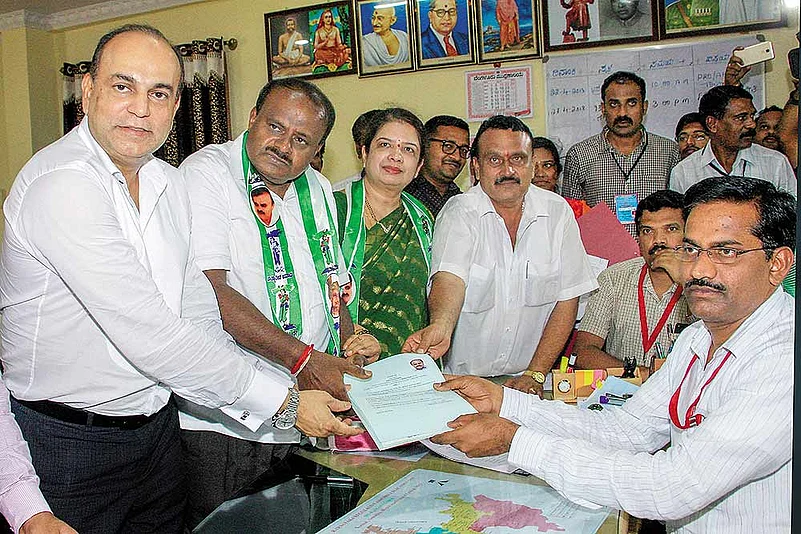As dusk sets in, a small group of MLA-hopefuls from the Janata Dal (Secular) waits patiently in the entrance hall at boss H.D. Deve Gowda’s residence in Bangalore. They have to collect their ‘B forms’—that’s the nomination paper. Tradition has it that the document, after being blessed at a temple, will be handed over to them personally by the party patriarch.
Two floors up the wood-panelled spiral staircase, 85-year-old Gowda sits on a chair in his bedroom, opposite a coffee table with a buzzer close at hand. There’s a Kannada news channel playing on low volume on the television, as partymen and visitors are let in one by one. “Today, if I go to bed early, that’s my good fortune,” says the veteran who’s keeping everybody guessing in an assembly election where the signs haven’t been easy to read.
The JD(S) isn’t making things any easier. Even if it is, the 1999-founded party is a shadow of what it once was, observers reckon. In southern Karnataka’s Old Mysore region, the BJP hasn’t been able to drill roots, but the JD(S) is still a strong presence as the prime opposition to the ruling Congress. So much so, even chief minister Siddaramaiah cannot take his own assembly seat in Chamundeshwari for granted. Gowda’s Vokkaliga community, the state’s second-largest caste group, has a say in many of the seats in this region, just as the Lingayats do in north Karnataka.
But what is the strength of the JD(S) in Mysore city’s Chamundeshwari seat where Siddaramaiah is the candidate? “Well, there are 40,000 Vokkaligas out of (an electorate) of 2.30 lakh. What is that, if he’s really an AHINDA leader?” Gowda says with a smirk. That is a taunt at his one-time protégé who believes his support base are the minorities, backward classes and Dalits—or AHINDA, as this acronym means in Kannada. Of course, Siddaramaiah is moving back to Chamundeshwari after a gap of two terms because his son Yathindra has taken his place in the Varuna seat next door. The BJP, too, is trying to pin down the duo in their constituencies.
The fight, at one level, appears personal between Gowda and Siddaramaiah. Even Congress national president Rahul Gandhi, says Gowda, was advised to ease up on the JD(S) after calling it the B-team of the BJP. “But Siddaramaiah went on attacking,” says Gowda. “That has irritated me. Otherwise why should I bother, I could have ignored him.”
The JD(S) knows that any tough contest with it in the fray will benefit the BJP, which acknowledges it. “The presence of JD(S) is always advantageous to us,” a BJP spokesman tells Outlook. “It’s more of a Congress vote that generally goes to the JD(S); they have never been a direct rival to us, anywhere, anytime.” Gowda, observers say, is counting on neither party getting a clear majority, which would put the JD(S) back in the reckoning for a coalition—it had happened in 2004.
However, he insists the JD(S) is equidistant from the two bigger parties “to protect our secular credentials”. Gowda points to his alliance with the Bahujan Samaj Party for 20 seats and the support promised by AIMIM head Asaduddin Owaisi and Telangana chief minister K. Chandrashekhar Rao. Siddaramaiah, not one to let slip an opportunity to annoy rivals, says any ‘strategy’ towards a coalition between the BJP and JD(S) is mere illusion. At Chamundeshwari, earlier this month, he ruffled feathers further, telling voters that the JD(S) won’t win more than 25 seats in the 224-member assembly. But after second thoughts, the CM is now also contesting from a second seat—in Badami, considered safer because his community, Kuruba, are in greater number there.
“Where’s the need to go to Badami and contest,” asks Gowda, claiming there’s anger against Siddaramaiah because he has sidelined other communities. “See, a caste enumeration was made,” notes Gowda. “Why has he not released it? More than 70 per cent of the people under the 2A (reservation category) are from his community.” Siddaramaiah points to his welfare schemes like foodgrain distribution and free education that have benefited the poor from every community.
The bitterness between Gowda and Siddaramaiah, 68, traces back to 2005 when the latter, then deputy CM, was expelled from the JD(S). Then, Gowda’s son, H.D. Kumaraswamy, pulled out from the ruling Congress-JD(S) and teamed up with the BJP to form a new government. It lasted 20 months. As the two fell out, it handed the BJP, primarily its leader B.S. Yeddyurappa, enough of a sympathy wave to win elections in 2008.
Over the years, the two leaders have often traded barbs. “He says that (Ramakrishna) Hegde was his mentor. Will people believe it? Hegde told me ‘don’t entertain that fellow’,” Gowda trails back. Yet, in 2015, his party allied with the Congress to wrest the municipal corporation Bruhat Bangalore Mahanagara Palike from the BJP. Then, in 2016, Siddaramaiah appeared to build bridges again with Gowda to whom he turned to when the Cauvery water crisis loomed. Even last year, when the Siddaramaiah-led Congress was cornered in a bypoll in Nanjangud where the CM’s prestige was at stake, the JD(S) helped by supplying the winning candidate. But subsequent Rajya Sabha polls were a different matter altogether: the Congress not only competed intensely, but also rallied support from JD(S) rebels.
Since then, the JD(S) dwindled, with a string of leaders leaving the party for its bigger rivals. Just last month, after the Rajya Sabha polls, the Congress netted 10 senior leaders from the party and gave many of them tickets to contest the upcoming assembly elections. Of course, the JD(S) too has been picking up disgruntled legislators from other parties, but observers generally reckon the exodus has left the party without enough leaders to represent its once-wide support base among minorities and backward castes. Besides, it’s long been seen as a family-run party where there have been squabbles even within the household over election tickets.
“They have become primarily a Vokkaliga party,” says political commentator Narendar Pani. “That also will be challenged...there are new Vokkaliga leaders emerging.” One of them is the BJP’s newly-recruited candidate for the Channapatna seat that lies adjacent to Sholay town Ramanagara, which is a Kumaraswamy stronghold. A former CM, he is now fighting elections from both Ramanagara and Channapatna. In his own seat, supporters say Kumaraswamy doesn’t need to campaign to win, but in the other he’ll need some help from the Congress—or so go the murmurs.
“This time, he has an opportunity again to become CM,” Anitha Kumaraswamy tells voters in Ramanagara from atop their custom-built bus. As Kumaraswamy takes over the mike from his wife, a thunder clap booms in the Ramanagara sky. “If it rains, it’ll be a blessing,” he says. The supporters whoop and whistle.
By Ajay Sukumaran in Bangalore


























